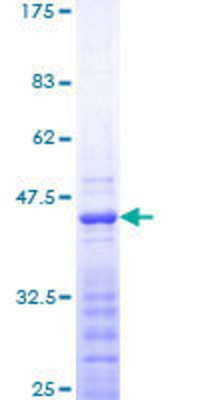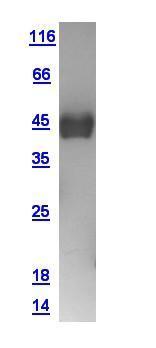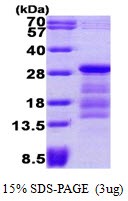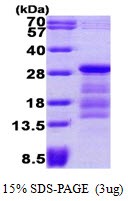PTTG1
| Gene Symbol | PTTG1 |
|---|---|
| Entrez Gene | 9232 |
| Alt Symbol | EAP1, HPTTG, PTTG, TUTR1 |
| Species | Human |
| Gene Type | protein-coding |
| Description | pituitary tumor-transforming 1 |
| Other Description | ESP1-associated protein 1|pituitary tumor-transforming gene 1 protein|securin|tumor-transforming protein 1 |
| Swissprots | O95997 |
| Accessions | AAF06995 BAH69081 BAH69082 CAY55983 EAW61551 EAW61552 EAW61553 O95997 AF062649 AAC69752 AF075242 AAD19335 AF095287 AAC64409 AJ223953 CAA11683 AK312209 BAG35142 BC026003 BC101834 AAI01835 BC108894 AAI08895 BC108895 AAI08896 BC112071 AAI12072 BC113842 AAI13843 BC113896 AAI13897 BC128193 AAI28194 BC128194 AAI28195 BI827526 BM990391 BU182149 CR457135 CAG33416 CR541685 CAG46486 HY006026 NM_001282382 NP_001269311 NM_001282383 NP_001269312 NM_004219 NP_004210 |
| Function | Regulatory protein, which plays a central role in chromosome stability, in the p53/TP53 pathway, and DNA repair. Probably acts by blocking the action of key proteins. During the mitosis, it blocks Separase/ESPL1 function, preventing the proteolysis of the cohesin complex and the subsequent segregation of the chromosomes. At the onset of anaphase, it is ubiquitinated, conducting to its destruction and to the liberation of ESPL1. Its function is however not limited to a blocking activity, since it is required to activate ESPL1. Negatively regulates the transcriptional activity and related apoptosis activity of TP53. The negative regulation of TP53 may explain the strong transforming capability of the protein when it is overexpressed. May also play a role in DNA repair via its interaction with Ku, possibly by connecting DNA damage-response pathways with sister chromatid separation. {ECO:0000269|PubMed:10411507, ECO:0000269|PubMed:11238996, ECO:0000269|PubMed:11371342, ECO:0000269|PubMed:1 |
| Subcellular Location | Cytoplasm. Nucleus. |
| Tissue Specificity | Expressed at low level in most tissues, except in adult testis, where it is highly expressed. Overexpressed in many patients suffering from pituitary adenomas, primary epithelial neoplasias, and esophageal cancer. {ECO:0000269|PubMed:9811450}. |
| Top Pathways | Cell cycle, Oocyte meiosis, HTLV-I infection |
Human Securin full length protein - ab87664 from Abcam
|
||||||||||
Human Securin full length protein - ab116478 from Abcam
|
||||||||||
Securin / PTTG1 Antibody Blocking Peptide - LS-E8887 from LifeSpan Bioscience
|
||||||||||
Securin Partial Recombinant Protein - H00009232-Q01 from Novus Biologicals
|
||||||||||
Recombinant Human Securin Protein - NBP1-30200 from Novus Biologicals
|
||||||||||
Securin Recombinant Protein - H00009232-P01 from Novus Biologicals
|
||||||||||
PTTG1-Antibody-N-term-Blocking-Peptide - BP7354a from Abgent, a WuXi AppTec company
|
||||||||||
Securin Protein - GTX111938-pro from GeneTex
|
||||||||||
PTTG1 Protein (OPPA01899) - OPPA01899 from Aviva Systems Biology
|
||||||||||
Human Pituitary Tumor-Transforming protein - orb81292 from Biorbyt
|
||||||||||
PTTG1 protein (His tag) - 80R-1183 from Fitzgerald
|
||||||||||
PTTG1/2/3 Blocking Peptide - abx063567 from Abbexa
|
||||||||||
Securin / PTTG1 (1-202, His-tag) - AR09247PU-L from Acris Antibodies
|
||||||||||
Securin / PTTG1 (1-202, His-tag) - AR09247PU-N from Acris Antibodies
|
||||||||||
Securin / PTTG1 - H00009232-P01-10 from Acris Antibodies
|
||||||||||
Securin / PTTG1 - H00009232-P01-25 from Acris Antibodies
|
||||||||||
Securin / PTTG1 - H00009232-Q01-10 from Acris Antibodies
|
||||||||||
Securin / PTTG1 - H00009232-Q01-25 from Acris Antibodies
|
||||||||||
Pituitary Tumor-Transforming Protein 1, Human Recombinant - 228-11346-1 from RayBiotech
|
||||||||||
Recombinant Human PTTG1 - 228-11346-2 from RayBiotech
|
||||||||||
Recombinant Human PTTG1 - 228-11346-3 from RayBiotech
|
||||||||||
PTTG1, 1-202 aa, Human, His-tagged, Recombinant, E.coli - 01-2142 from ARP American Research Products
|
||||||||||
PTTG1 fusion protein - ag12670 from Proteintech Group
|
||||||||||
PTTG1 fusion protein - ag12688 from Proteintech Group
|
||||||||||
PTTG1 Human - PRPS-724 from NeoScientific
|


![SDS-Page: Securin Protein [NBP1-30200] - PTTG1, 24.1 kDa (222aa), confirmed by MALDI-TOF with a purity of 80% by SDS - PAGE](http://www.bioprodhub.com/system/product_images/pp_products/5/sub_1/28670_Securin%2520Protein-SDS-Page-NBP1-30200-img0001.jpg)


